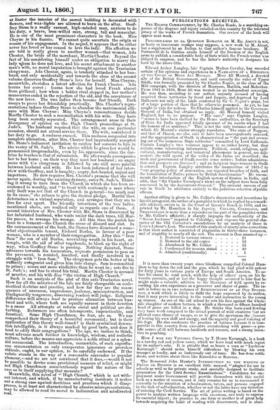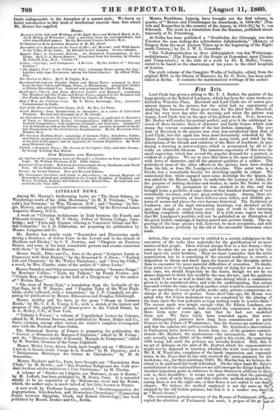PUBLICATIONS RECEIVED
TER Emiriar Coarmsruasnwr, by Mr. Charles Reade, is a searching ex- posure of the disgrace and injury entailed on this country by the tolerated piracy of the works of French dramatists. Our review of the book will appear next week.
PRELLIIINAIRES DE LA QUESTION RObLAINH DE M. RD. ABOUT is not, as hasty or inaccurate readers may suppose, a new work by M. About, but a supplement by an Italian to that author's famous brochure. M. Petruccelli de is Gattina avails himself of the freedom of the English press to publish a considerable body of facts which the French writer was obliged to suppress, and he has the latter's authority to designate his book by the above title. .
Edward Archer Langley, late Captain Madras Cavalry, has recorded certain of his opinions and experiences in a Nennarren OF RESIDENCE AT TIRE COURT OF MEER Aar MoonAn. Meer All Moored, a devoted ally of the British Government, and until recently the ruler of Upper Sindh, was formally presented by Sir Charles Napier, at the close of the Hill campaign, with the districte of Meerpore, Matihla, and Meherkee. From 1843 to 1860, Meer All was treated as an independent sovereign. He was then, according to our author, unjustly accused of having acquired these territories by fraud and forgery, and deprived by Lord Dalhousie not only of the lands conferred by Sir C. Napier's grant, but of a large portion of those that he otherwise possessed. As yet, he has sought in vain for redress. Sir Charles himself applied to the Governor- General of India, but obtained no reply. All Moored himself visited England, but to no purpose. "His case," says Captain Langley, " seems to have been shelved by the Home authorities, as the Secretary of State for India appeared totally ignorant of its merits when I had the honour of an audience." This is not the only instance of spoliation which All Moorad's visitor strongly reprobates. The state of Nagpore, and that of Jhansi, are also said to have been unscrupulously annexed, and the appropriation of Oudh is characterized as " the past and crown- ing act of the numerous State robberies " committed by Lord Dalhousie. Captain Langley's two volumes appear to us rather heavy, but they contain some interesting information. Political, social, religious, agri- cultural, manufacturing, and industrial phenomena in general, are deli- neated; the wild sports of the valley of the Indus are described ; the trade and government of Sindh receive some notice; Indian administra- tion and prospects are discussed ; and an incipient improvement in Oudh is attested. Captain Langley attributes the insurrection of 1861-7 to "our grasping policy of annexation, our repeated breaches of faith, and the humiliation of Native princes by British functionaries." He recom- mends the introduction of the English system of finance in India, and adds, that " Sir Charles Trevelyan's views on the subject have been fully concurred in by the Accountant-General." The eminent success of our rule in Sindh he attributes entirely to the judicious selection of public officers.
Another sifting is given to Mr. Collier's discoveries and inventions by his old antagonist, the author of a pamphlet to which be replied by a remark- able affidavit, sworn to in the Court of Queen's Bench in 1856, and re- printed by Mr. Hamilton in his Inquiry. Comazu, Cormarnoe, and SHAKESPEARE is more than a rejoinder on the part of the pamphlet-writer to Mr. Collier's affidavit ; it sharply impugns the authenticity of the " Seven Lectures " imputed to Coleridge, and exposes the general cha- racter of the Old Corrector's emendations by an analysis of those in Love's Labour's Lost. The result of this analysis of ninety-nine corrections is that their author is convicted of plagiarism in thifty-three instances, and of stupidity in nearly all the rest. The account is thus summed up-
1. Restored to various owners 21 2. Restored to the old copies . . • . 12 3. Abandoned by Mr. Collier .. . • . 25 4. Condemned for reasons stated . 40 5.. Admitted (conditionally) . . . 1 99
It is more than twenty years since blindness compelled Colonel Ham- ilton to lay down the rod and the gun, which he had plied with ardour for forty years in various parts of Europe and South America. To so- lace his ennui he read much, with the help of others' eyes, on his fa- vourite pursuits, and at last the happy thought occurred to him that he might make a valuable addition to the literature of field sports by re- cording his own experience as a preserver and slayer of game. The re- sult is before us in two volumes of REMECISCF.NCES or AN OLD Bronze- MAN, a work which is likely to fulfil the hope expressed by its author, that it may prove interesting to the reader and instructive to the young sp ,rtsman. As one of the old school he sets his face against the whole- sale slaughter of modern battues, in which a thousand or fifteen hundred head of game are killed in a day. He thinks this barn-yard fowling very tame work compared to the actual pursuit of wild creatures that are allowed some chance of escape, so as to give the sportsman the pleasure
of testing his own skill and energy, and the sagacity and good training of his dogs. He also condemns the practice of battues because it is inse- parable in this country from excessive overstocking with game—a pro- lific source of ill will between landlords and tenants, and a strong incen- tive to poaching.
How I wort THE Vicronre Cnoss, by T. Henry Kavanagh, is a book in a tawdry red and yellow cover, which we have read with much regivt for its author's sake. It is pitiable that so brave a man as " Lucknow Kavanagh " should make himself ridiculous by blowing his own trumpet so loudly, and so ludicrously out of tune. lie has done noble deeds, and written about them like Katerfelto or Barnum.
The Reverend John Hunter's Its-rnonecrrox TO ears werrrsu or Folds ox Diaewrs is an excellent little manual, " adapted for use in schools as well as for private study, and specially designed to facilitate preparation for the Civil Service Examinations." Candidates for em- ployment under Government will provide themselves with this useful book as a matter of comae,. and it only remains for us to recommend it earnestly to the attention of schoolmasters, tutors, and persons engaged in the task of self-education, Whether or not tho latter have any intention of entering the Civil Service. The art of precis writing is based on the power to analyze written language with exactness, and truly to express its essential import; its practice in one form or another is of great help towards acquiring the habit of reading with discernment, and is abso-
lutely indispensable to the formation of a correct style. We know no better introduction to this kind of intellectual exercise than that which Mr. Hunter has supplied.
Boons.
Memoirs of the Life and Writings of the Right Reverend Richard Hurd, D.D., Lord Bishop of Worcester; • with a selection from his correspondence and other unpublished papers. By the Reverend Francis Kilvert, M.A. Praiminaires is to Question Romaine de M. Ed. About.
Narrative of a Residence at the Court of Meer All Moorad ; with Wild Sports in the Valley of the Indus. By Edward Archer Langley. In two volumes. Egypt's Place in Universal History. An Historical Investigation, in five books. By C. C. J. Baron Bunsen. Translated from the German, by Charles H. Cottrell, Esq., M.A. Volume IV.
Collier, Coleridge, and Shakspeare. A Review. By the Author of " Literary Cookery."
"The Eagle's Neat" in the Valley of Silt; a Summer Home among the Alps together with some Excursions among the Great Glaciers. By Alfred Wills, Esq.
The Psalms in Metre. By C. B. Cayley, B.A.
One-hundred-and-one Popular Psalm and Hymn Tunes: arranged in short Score for four Voices and Organ, Piano, or Harmonium. Adapted for Public or Private Devotional Use. Selected and arranged by Charles H. Purday. Routledge's Church and Home Metrical Psalter and Hymnal; containing One Hundred and One Psalm and Hymn Tunes, adapted to Six Hundred and Oue Psalm and Hymn Tunes. Edited by Charles H. Purday.
How I Won the Victoria Cross. By T. Henry Kavanagh, Esq., Assistant- Commissioner in Oudh.
Life of the Reverend Charles Orpen, MD. By Mrs. Le Farm.
Greek History ; from Themistocles to Alexander, in a series of Lives from Plutarch. Revised and Arranged by A. H. Clough.
An Introduction to the Writing of Precis or Digests, as applicable to Narrative of Facts or Historical Events, Correspondence, Official Documents, and General Composition ; with numerous Examples and Exercises. Adapted for Use in Schools as well as for Private Study, and specially designed to facili- tate Preparation for the Civil Service Examinations. By the Reverend John Hunter, M.A.
The German Reading-Book; consisting of German Tales, Anecdotes, Fables, and Poetry, progressively arranged for beginners , with a complete vocabulary at the foot of the pages ; and an Appendix of German Expletives. By Wolf- gang Heinrich Just.
Fathek, a Dramatic Poem ; The Dream of the Captive City; and other Poems. By George Yeilding Mac Mahon.
NEW EDITIONS AND REPRINTS.
An Outline of the necessary Laws of Thought ; a Treatise on Pure and Applied Logic. By William Thomson, D.D. Fifth edition.
Practical Swiss Guide. Red-hook for Switzerland, Savoy, Piedmont, and North Italy. By an Englishman Abroad. Fifth edition.
Poems ; by Archer Gurney. New and Revised Edition.
The Newspaper Gazetteer and Guide to Adrertisers ; an Annual Register of Newspapers printed and published in the United Kingdom of England and Wales, Scotland, Ireland, and Islands in the British Seas. Revised and cor- rected for the Year 1860.



























 Previous page
Previous page